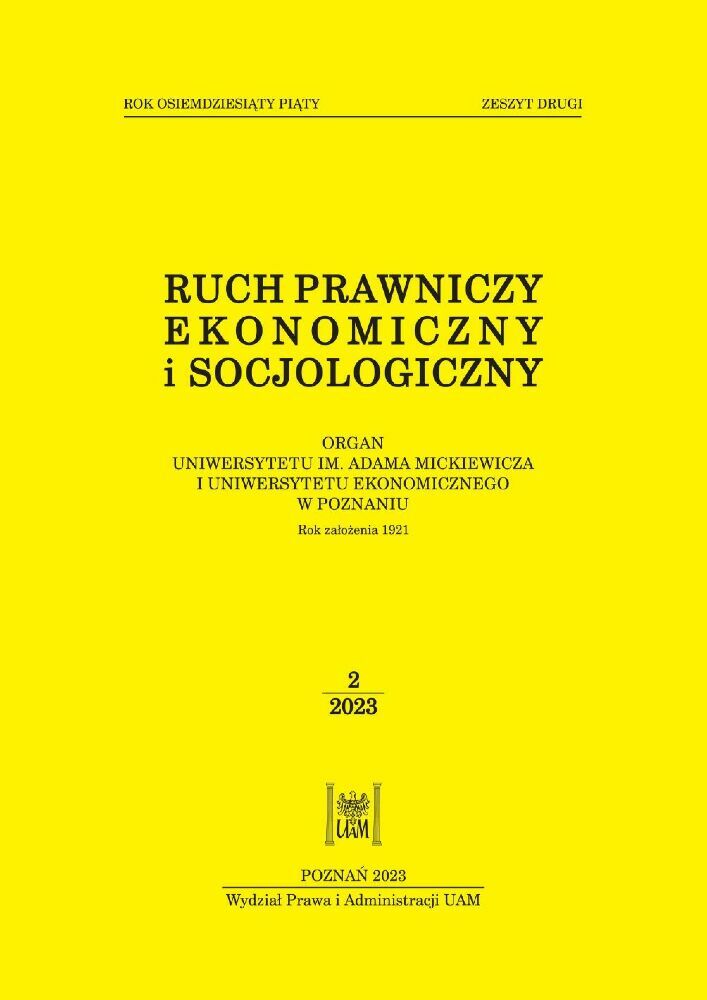Abstract
One of the rules contained in the Code of Good Administrative Behavior adopted in 2001 by the European Parliament is the principle of impartiality and independence (Article 8). The presence of this rule, despite its non-binding nature, prompted the author to examine – using the method of comparative law analysis – whether the EU Member States have regulated this issue in their legal systems – and if so, to what extent and how. The basic institution serving the implementation of this principle is the disqualification of an employee of the authority from participation in the proceedings in situations where their impartiality seems to be at risk. Not all EU countries explicitly provide for such an institution. Among the legal systems that contain it, only some regulate the entirety of issues related to it: the grounds for disqualification, the procedure for disqualification and the consequences of it, as well as the appealability of orders taken in this matter and the consequences of violating the provisions on disqualification. Regulations of individual issues differ in the degree of detail. This applies primarily to the reasons for the disqualification of an employee of the authority. The most important reason for the disqualification of employees (except when they or their spouse are a party to the proceedings) is the consanguinity or affinity between them and the party. However, the ranges of such ties resulting in automatic disqualification of an employee, adopted in EU member states, differ significantly. The second area of significant difference is the consequences of the potentially biased employee’s participation in the proceedings. The solutions adopted in this regard in legislation and jurisprudence depend on how the main purpose of the provisions concerning the disqualification of an employee is perceived: as strengthening the public’s trust in the executive, or as a fair settlement of the matter.
References
Alekseev, S.S. (1982). Obshchaya teoriya prava [General Theory of Law]. Vol. 2. Moscow: Yuridicheskaya literaturа.
Alexis, F. (1979). Reasonableness in the Establishing of Bias. Public Law: 143–155.
Chekalina, О.V. (2004). Protsessuаl’nӯe prava grazhdan v sfere administrativnoĭ yurisdiktsii [Procedural rights of citizens in the area of administrative jurisdiction]. In N.Yu. Khаmаneva (ed.), Administrativno-pravovoǐ status grazhdanina [The Status of a Citizen in the Light of Administrative Law] (pp. 179–191). Moscow: Institut gosudarstva i prava rossiĭskoĭ akademii nauk.
Grimes, R.H., Horgan, P.T. (1981). Introduction to Law in the Republic of Ireland. Portmarnock, Co. Dublin: Wolfhound Press.
Groves, M. (2009). The Rule Against Bias. Hong Kong Law Journal 39: 485–514. http://classic.austlii.edu.au/au/journals/UMonashLRS/2009/10.html
Hogan, G., Morgan, D.G. (1991). Administrative Law in Ireland. London: Sweet & Maxwell.
Isaac, G. (1968). La procédure administrative non contentieuse. Paris: Librairie générale de droit et de jurisprudence.
Kmiecik, Z.R. (2020). Wyłączenie pracownika organu od udziału w ogólnym postępowaniu administracyjnym [Disqualification of an Employee of a Public Administration Authority from Participation in General Administrative Proceedings]. Warsaw: Wolters Kluwer.
Maier, T. (2001). Befangenheit im Verwaltungsverfahren. Die Regelungen der EU-Mitgliedstaaten im Rechtsvergleich. Berlin: Duncker & Humblot. DOI: https://doi.org/10.3790/978-3-428-50181-6
O’Reilly, J., Redmond, M. (1980). Cases and Material on the Irish Constitution. Dublin: Incorporated Law Society of Ireland.
Pharr, C. (trans.) (1952). The Theodosian Code and Novels and the Sirmondian Constitutions: A Translation with Commentary, Glossary, and Bibliography. Princeton: Princeton University Press.
Rebordão Montalvo, A.M. (1992). Código do procedimento administrativo. Coimbra: Almedina.
Scott, S.P. (trans.) (1932a). The Code of Justinian. Translation. Cincinnati. https://droitromain.univ-grenoble-alpes.fr/Anglica/codjust_Scott.htm
Scott, S.P. (trans.) (1932b). The Digest or Pandects of Justininan. Translation. Cincinnati. https://droitromain.univ-grenoble-alpes.fr/Anglica/digest_Scott.htm
Smith, S.A. De, Woolf, H., Jowell, J. (1995). Judicial Review of Administrative Action. London: Sweet & Maxwell.
Waard, B.W.N. de. (1987). Beginselen van behoorlijke rechtspleging met name in het administratief processrecht. Zwolle: Tjeenk Willink.
Zwingli, H. (1544). Farrago annotationum in Exodum (1527). In Operum d. Huldrychi Zwinglii tomus tertius, ea, quae in Genesim, Exodum, Esaiam & Ieremiam prophetas, partim ex ore illius excepta, partim ab illo conscripta sunt, una cum Psalterio Latinitate donato, co[n]tinens (pp. 4–125). Tiguri (Zürich). https://books.google.pl/books?id=L21WAAAAcAAJ&printsec=frontcover&hl=pl&source=gbs_ge_summary_r&cad=0#v=onepage&q&f=false
License
Copyright (c) 2023 WPiA UAM

This work is licensed under a Creative Commons Attribution 4.0 International License.





